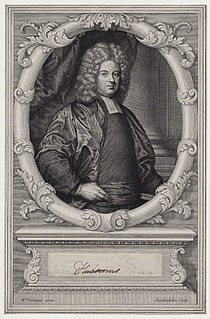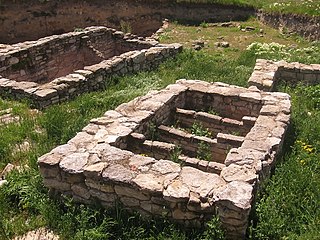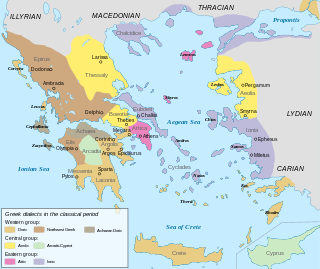
Publius Terentius Afer, better known in English as Terence, was a Roman playwright during the Roman Republic, of Berber descent. His comedies were performed for the first time around 170–160 BC. Terentius Lucanus, a Roman senator, brought Terence to Rome as a slave, educated him and later on, impressed by his abilities, freed him. Terence apparently died young, probably in Greece or on his way back to Rome. All of the six plays Terence wrote have survived.
Hesychius of Miletus, Greek chronicler and biographer, surnamed Illustrius, son of an advocate, flourished at Constantinople in the 6th century AD during the reign of Justinian.
The Second Sophistic is a literary-historical term referring to the Greek writers who flourished from the reign of Nero until c. 230 AD and who were catalogued and celebrated by Philostratus in his Lives of the Sophists. However, some recent research has indicated that this Second Sophistic, which was previously thought to have very suddenly and abruptly appeared in the late 1st century, actually had its roots in the early 1st century. It was followed in the 5th century by the philosophy of Byzantine rhetoric, sometimes referred to as the "Third Sophistic."
Aelius Donatus was a Roman grammarian and teacher of rhetoric. St. Jerome states in Contra Rufinum 1.16 that Donatus was his tutor.
Aelius Theon was an Alexandrian sophist and author of a collection of preliminary exercises (progymnasmata) for the training of orators. He probably lived and wrote in the mid to late 1st century AD and his treatise is the earliest treatment of these exercises.

Publius Aelius Aristides Theodorus was a Greek orator and author considered to be a prime example of the Second Sophistic, a group of celebrated and highly influential orators who flourished from the reign of Nero until c. 230 CE. More than fifty of his orations and other works survive, dating from the reigns of Antoninus Pius and Marcus Aurelius. His early success was interrupted by a decades-long series of illnesses for which he sought relief by divine communion with the god Asclepius, effected by interpreting and obeying the dreams that came to him while sleeping in the god's sacred precinct; he later recorded this experience in a series of discourses titled Sacred Tales . In his later life, Aristides resumed his career as an orator, achieving such notable success that Philostratus would declare that “Aristides was of all the sophists most deeply versed in his art.”

John Hudson, English classical scholar, was born at Wythop, near Cockermouth in Cumberland.
Thomas, surnamed Magister or Magistros, also known by the monastic name Theodoulos Monachos, was a native of Thessalonica, a Byzantine scholar and grammarian and confidential adviser of Andronikos II Palaiologos.

Lake Moeris is an ancient lake in the northwest of the Faiyum Oasis, 80 km (50 mi) southwest of Cairo, Egypt. In prehistory, it was a freshwater lake, with an area estimated to vary between 1,270 km² (490 mi²) and 1,700 km² (656 mi²).

Faiyum is a city in Middle Egypt. Located 100 kilometres southwest of Cairo, in the Faiyum Oasis, it is the capital of the modern Faiyum Governorate. Originally called Shedet in Egyptian, the Greeks called it Koine Greek: Κροκοδειλόπολις Krokodilópolis, the Romans Arsinoë. It is one of Egypt's oldest cities due to its strategic location.
Gaius Aelius Gallus was a Roman prefect of Egypt from 26 to 24 BC. He is primarily known for a disastrous expedition he undertook to Arabia Felix under orders of Augustus.

Tyritáke was an ancient Greek town of the Bosporan Kingdom, situated in the eastern part of Crimea, about 11 km to the south from Panticapaeum. It is tentatively identified with the ruins in the Kerch district of Kamysh-Burun (Arshintsevo), on the shore of the Cimmerian Bosporus.
Sextus Aelius Paetus Catus or Sextus Aelius Q.f. Paetus Catus, was a Roman Republican consul, elected in 198 BC. Today, he is best known for his interpretation of the laws of the Twelve Tables, which is known to us only through the praise of Cicero. Paetus Catus came from a prominent plebeian noble family; his father was a praetor, and his elder brother was another consul, Publius Aelius Paetus.

The Faiyum Oasis is a depression or basin in the desert immediately to the west of the Nile south of Cairo in Egypt. The extent of the basin area is estimated at between 1,270 km2 (490 mi2) and 1700 km2 (656 mi2). The basin floor comprises fields watered by a channel of the Nile, the Bahr Yussef, as it drains into a desert depression to the west of the Nile Valley. The Bahr Yussef veers west through a narrow neck of land north of Ihnasya, between the archaeological sites of El Lahun and Gurob near Hawara; it then branches out, providing rich agricultural land in the Faiyum basin, draining into the large saltwater Lake Moeris. The lake was freshwater in prehistory but is today a saltwater lake. It is a source for tilapia and other fish for the local area.
The gens Aelia, occasionally written Ailia, was a plebeian family in Rome, which flourished from the fifth century BC until at least the third century AD, a period of nearly eight hundred years. The archaic spelling Ailia is found on coins, but must not be confused with Allia, which is a distinct gens. The first member of the family to obtain the consulship was Publius Aelius Paetus in 337 BC.
Aelius Dionysius was a Greek rhetorician from Halicarnassus, who lived in the time of the emperor Hadrian. He was a very skillful musician, and wrote several works on music and its history. It is commonly supposed that he was a descendant of the elder Dionysius of Halicarnassus, author of Roman Antiquities, a history of Rome from its founding to the middle third century BCE.
Atticista is a surname that can refer to two people in Classical history:
Aelius Promotus was an ancient physician of Alexandria, of whose personal history no particulars are known, and whose date is uncertain. He is supposed by Villoison to have lived after the time of Pompey the Great, that is, in the 1st century BC. By others he is considered to be much more ancient; yet other scholars place him as late as the second half of the 1st century AD. He is most probably the same person who is quoted by Galen simply by the name of Aelius. He wrote several Greek medical works, which are still to be found in manuscript in different libraries in Europe. The treatise On venomous beasts and poisonous drugs, attributed to Aelius, was last published in 1995. His main work titled Δυναμερόν, was first published in its complete extension in 2002 by Daria Crismani. Two other of his works are quoted or mentioned by Hieronymus Mercurialis. And also by Schneider in his prefaces to Nicander's Theriaca, and Alexipharmaca.
Alexander of Cotiaeum was a Greek grammarian, who is mentioned among the instructors of the Roman emperor Marcus Aurelius. We still possess an epitaph pronounced upon him by the rhetorician Aelius Aristides, who had studied under Alexander.









